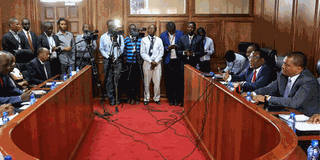House Speakers set for difficult tenures

The two speakers of Parliament Justin Muturi (right) of National Assembly and Ekwe Ethuro (2nd right) speaker of Senate meet IEBC commissioners at parliament Buildings on January 26, 2017. The two speakers are expected to defend their seats in the 12th parliament based on their support for Jubilee Party. PHOTO | JEFF ANGOTE | NATION MEDIA GROUP
What you need to know:
There have been three similar transitions in Parliament that were made successful by assertive and respected Speakers.
- It is expected that those who led the last Parliament will be defending their positions hinged on their support for Jubilee.
The challenge for the next Speakers will be to restrain Jubilee’s tyranny over a feeble minority.
The incoming National Assembly and the Senate are set for one of the most difficult tenures of presiding over a great transition.
Observers say the transition will require headstrong, assertive and unblemished Speakers to guide MPs and senators to the next legislative era particularly because Jubilee has an almost absolute majority.
TRANSITION
There have been three similar transitions in Parliament that were made successful by assertive and respected Speakers.
Even as the country awaits the determination of a presidential election petition filed in the Supreme Court on Friday night, the two Houses of Parliament will be transitioning from President Uhuru Kenyatta of the Jomo Kenyatta dynasty while the era of the country’s Opposition doyen Jaramogi Oginga Odinga’s dynasty seems to be at its tail end after Nasa leader Raila Odinga hinted he will not run for President again.
It is expected that those who led the last Parliament — National Assembly Speaker Justin Muturi and his Senate counterpart Ekwe Ethuro — will be defending their positions hinged on their support for Jubilee.
Incumbency in the Speakership is, however, no guarantee of automatic victory.
REWARD
Possible aspirants mentioned for House Speaker— especially the Senate — include former chairman of the Commission for the Implementation of the Constitution Charles Nyachae, former Bungoma Governor Ken Lusaka, former Budalang’i MP Ababu Namwamba, and former Ainabkoi MP Samuel Chepkonga among others.
Mr Muturi and Mr Ethuro will be facing a Jubilee leadership under pressure from various regions in the country agitating for their sons and daughters to be rewarded for supporting the Jubilee Party in the elections.
So far, Mr Muturi appears ensconced in his seat as any serious competitor is yet to emerge.
Despite his critics faulting his performance and partisanship in the Eleventh Parliament, Mr Muturi seems assured of Jubilee’s support should he be on the ballot.
SOBER AND CONSIDERATE
But there seems to be doubt about guaranteed support for Mr Ethuro from the ruling party.
His performance in the first Senate was applauded by both friend and foe as a Speaker who was sober and considerate in his rulings.
His admirers were quick to point out that he ruled without being partisan.
Mr Ethuro has a 25-year experience in Parliament, having joined in 1992.
CREDENTIALS
Here, an emboldened Jubilee with a majority in both Houses will be on trial as it will grapple with a choice to reward individuals at the expense of credentials.
If the party prefers Mr Nyachae, the former CIC chairman, it will risk having someone without parliamentary experience.
For example, the lack of experience in the House by Prof Jonathan Ng’eno, the Speaker of the Sixth Parliament, was laid bare.
He entered Parliament in 1979 and went straight to the Cabinet, thereby, being denied a chance to gain experience on the floor.
The hard choice for Jubilee will be to ensure continuity in the bicameral House, normally preferred in the Commonwealth parliamentary system.
WINNING GOAL
Alternatively, the party risks the danger of two Houses of Parliament that will be unable to preside over what is likely to be a defining moment in Kenya’s politics.
Like in football, the weakened Opposition in both Houses could still score the winning goal.
The Opposition may end up playing a diplomatic role in the election of the two Speakers to ensure the success of this landmark transition.
But ultra-majority Jubilee and a Nasa minority ought to take historical lessons from the past where sobriety and wisdom overrides dictatorship that goes with the so-called “tyranny of numbers”.
FIRST SPEAKER
Independence Kenya’s first Speaker, Sir Humphrey Slade (1963-70), was a wise choice – referred to as the “Linking Speaker”.
Knighted by the Monarch for his good inter-racial relations in Kenya, in today’s parlance he would be from the minority ethnic group.
Incidentally Kanu with a majority and Kadu a minority unanimously elected him Speaker of the Lower House.
Mr Muinga Chokwe was elected Speaker of the Senate in the first-ever bicameral House.
It was a critical stage which required a man of wisdom, age and diplomacy.
TRYING MOMENTS
Today, the two Houses are headed in a similar direction as there are bound to be trying moments ahead.
The second critical transition came with the election of Francis Kaparo (1993 – 2008).
Subjected to all three stages of House election, he was witty, assertive and even humorous presiding over a hostile Seventh Parliament after emotive first multi-party elections in decades in 1992.
He is credited with bringing down hostilities in an adversarial Parliament, pitting angry Opposition and loyalist Kanu government MPs.
Mr Kaparo successfully transitioned Parliament to emerge from single party dictatorship to a multi-party House.
RESTRAIN
The challenge for the next Speakers will be to restrain Jubilee’s tyranny over a feeble minority.
Mr Kaparo’s successor, Mr Kenneth Marende (2008-13), was elected amid chaos in Parliament and violence in the country, following the 2007 disputed presidential election results.
Mr Marende summoned his wisdom each time he made any ruling.
He shocked his ODM MPs who were against swearing when he ruled that all MPs would be sworn in to signify the start of the 10th Parliament.
He earned fame by being non-partisan, interpreting correctly the new Constitution and blocking unlawful appointments.




